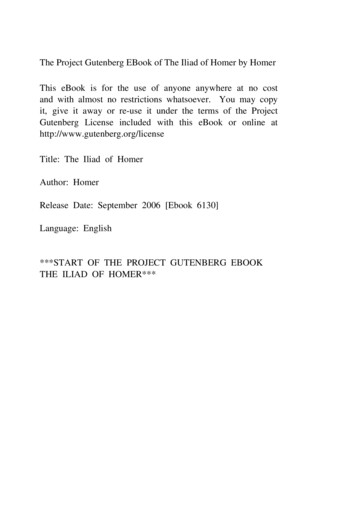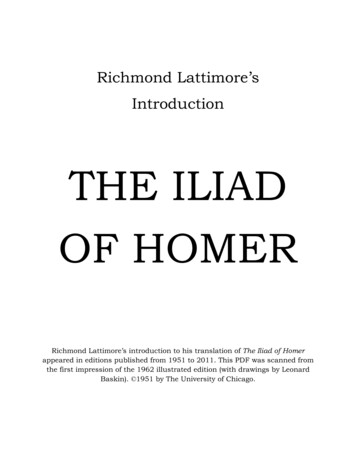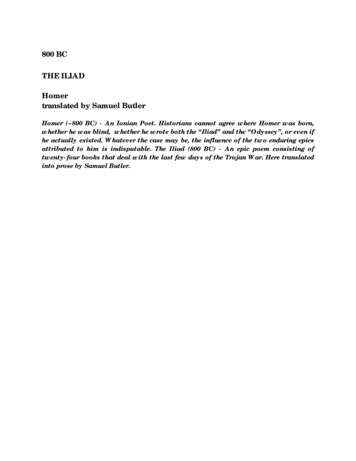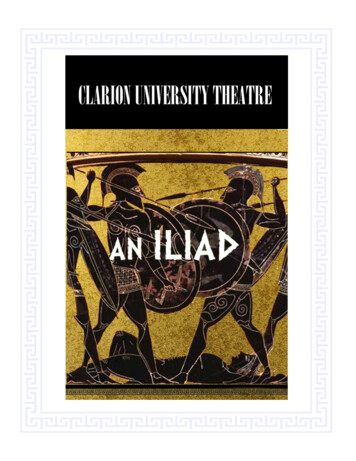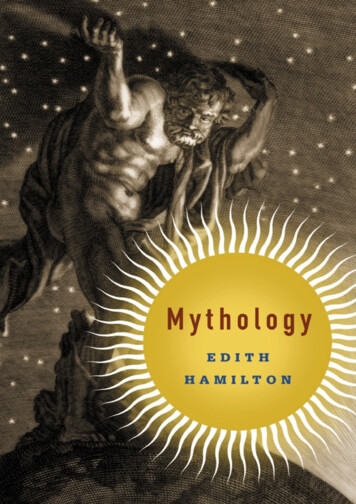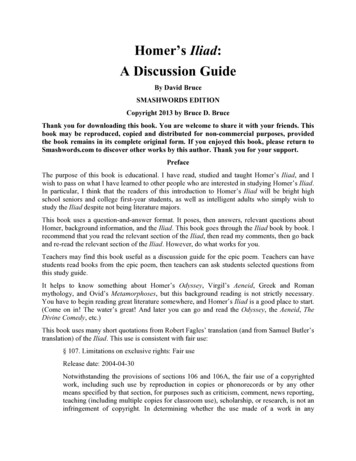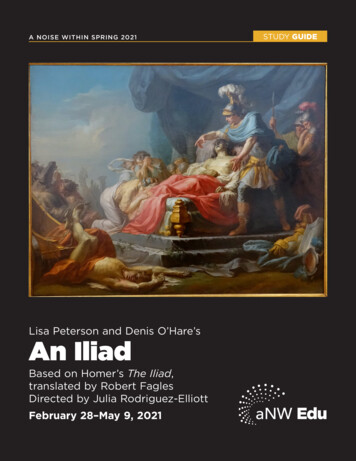
Transcription
A NOISE WITHIN SPRING 2021STUDY GUIDELisa Peterson and Denis O’Hare’sAn IliadBased on Homer’s The Iliad,translated by Robert FaglesDirected by Julia Rodriguez-ElliottFebruary 28–May 9, 2021Edu
STUDY GUIDES FROM A NOISE WITHINA rich resource for teachers of English,reading, arts, and drama education.Dear Reader,We’re delighted you’re interested in our studyguides, designed to provide a full range ofinformation on our plays to teachers of all gradelevels.A Noise Within’s study guides include: eneral information about the playG(characters, synopsis, timeline, and more) Playwright biography and literary analysis Historical content of the play Scholarly articles Production information(costumes, lights, direction, etc.) Suggested classroom activities Related resources (videos, books, etc.) Discussion themes ackground on verse and proseB(for Shakespeare’s plays)Our study guides allow you to review and shareinformation with students to enhance bothlesson plans and pupils’ theatrical experienceand appreciation. They are designed to let youextrapolate articles and other information that bestalign with your own curricula and pedagogic goals.More information? It would be our pleasure. We’rehere to make your students’ learning experience asrewarding and memorable as it can be!All the best,Alicia GreenDIRECTOR OF EDUCATIONPictured: Carolyn Ratteray, Evan Lewis Smith, and Veralyn Jones, Gem of the Ocean2019. PHOTO BY CRAIG SCHWARTZ.
TABLE OF CONTENTSCharacter Maps: An Iliad and The Iliad. . . . . . . . . . . . . . . . . 4Synopsis . . . . . . . . . . . . . . . . . . . . . . . . . . . . . . . . . . . . . . . . . . . . 6About the Author: Homer. . . . . . . . . . . . . . . . . . . . . . . . . . . . . 7About the Adaptors: Denis O’Hare and Lisa Peterson . . . . 8History of The Iliad: A Timeline . . . . . . . . . . . . . . . . . . . . . . . 10Ancient Greek Society . . . . . . . . . . . . . . . . . . . . . . . . . . . . . . . 11Ancient Oral Poetic Tradition. . . . . . . . . . . . . . . . . . . . . . . . . 12Greek Mythology: The Role of the Muses . . . . . . . . . . . . . . 13Gods, Monsters, and Men in Greek Mythology. . . . . . . . . . 14The Hero’s Journey. . . . . . . . . . . . . . . . . . . . . . . . . . . . . . . . . . 15Themes. . . . . . . . . . . . . . . . . . . . . . . . . . . . . . . . . . . . . . . . . . . . . 17The Trojan War: Fact or Fiction? . . . . . . . . . . . . . . . . . . . . . . 18A Big Splash: A Conversation withA Noise Within’s Production Team about the Pool Set. . . 19Pre-Show Preparation: Research. . . . . . . . . . . . . . . . . . . . . 20Pre-Show Preparation: Activities. . . . . . . . . . . . . . . . . . . . . . 21Essay Questions. . . . . . . . . . . . . . . . . . . . . . . . . . . . . . . . . . . . . 23Additional Resources . . . . . . . . . . . . . . . . . . . . . . . . . . . . . . . 24A NOISE WITHIN’S EDUCATION PROGRAMS MADE POSSIBLE IN PART BY:Ann Peppers FoundationThe Green FoundationCapital Group CompaniesKenneth T. andEileen L. Norris FoundationMichael J. ConnellFoundationThe Dick and Sally RobertsCoyote FoundationThe Jewish CommunityFoundationRalph M. Parsons FoundationSteinmetz FoundationDwight Stuart Youth FundSpecial thanks to our Dinner On Stage donorswho kept the arts thriving this year bysupporting our Student Matinees (SMATs):SMAT PERFORMANCE SPONSOR( 5,000 AND ABOVE)Richard GreenSheila & Alan LamsonJeanie & Terry KayBarbara LawrenceWilliam & PriscillaTerri MurrayKennedyRichard & Sally RobertsSCHOOL SPONSOR ( 2,500 AND ABOVE)Bill & Clarie BogaardJulie & Lance MarkowitzKathleen &Bruce & Valerie MerrittJames DrummyLyn SpectorSheila Grether-Marion &Lois TandyMark MarionLiz & Rhodes TrussellBarbara HendersonCLASS SPONSOR ( 1,000 AND ABOVE)Molly BachmannEugene KapaloskiMeg Huntington CajeroThomas & Gloria LangJack & Becky DoodyJay LesigerFred & Sandy EnglerCynthia Nunes &Armando GonzalezBarbara NyeDiane GrohulskiDiana Peterson-MoreSchuyler &Gail Samuel &Deborah HollingsworthWilliam ChristianRobert & Jennifer IsraelMargaret SedenquistDenise JayTribune DirectMiranda Johnson-HaddadVickie TaylorMolly JosephWORKSHOP SPONSOR ( 500 AND ABOVE)Robert CathcartBob Low, in honor of wifeCecilia CenterAnni Frandsen Low,John CushmanPh.D.Julie DanielsAlan MillerPatrick GarciaJulia Rodriguez-ElliottSandra GreensteinJanet SamuelSelma Holo & Fred CrotonDeborah StrangDavid HoltzDonna Tucker, in memoryForsight Creationsof Beverly ParksJim KellyTuckerArthur J. Gallagher & Co.Loretta VigilJason KingMarianne WallaceElyse KleinDavid & Julia ZuckermanBUS SPONSOR ( 350 AND ABOVE)Wendy AldenAllan MohrmanJulie Fox BlackshawScott MyersMary HackerNorma RichmanIlona LindenEdmund RobertsNancy MackyDaniel RothmullerJoan MillsChromaticInteractive MediaADDITIONAL DONORSJerry Gallagher &Linda SaurenmanGerard ClarkeStuart SemigranMargaret GrossmanAngela Conner &Margaret KochKevin SpeaksIrene LacherSallie StrangMark NelsonJan SandersCover Image: Achilles Displaying the Body of Hector at the Feet of Patroclus by Jean-Joseph Taillasson c.1769, Public Domain
4 A NOISE WITHIN REPERTORY SEASON Spring 2021 Study GuideAn IliadCHARACTER MAP AN ILIADPoetA storyteller and a traveler. Plays all of the belowroles as they tell the story of the Trojan War.HermesGreek god, son of Zeus. Appearsas a messenger for the gods.GREEKSTROJANSAgamemnonLeader of the Achaean (Greek) army.Brother to Menelaus andbrother-in-law to Helen.PriamKing of Troy. Fatherof Hector and Paris.Hecuba’s husband.ThetisAchilles’ mother, a sea-nymph.ParisHector’s brother,known for stealingHelen fromMenelaus andbeginning the war.Avoids going intobattle at all costs.AchillesA demigod, son of Peleus andsea-nymph Thetis. Most powerfulwarrior in the Trojan War, fightsfor the Greeks.PatroclusA close friend of Achilles.HecubaQueen of Troy.Mother of Hector andParis. Priam’s wife.HectorA Trojan warrior. Sonof Hecuba and Priam.Paris’ brother.AndromacheHector’s wife.HelenMenelaus’ wife. Fled to Troy with Paris.Known for her beauty.
5 A NOISE WITHIN REPERTORY SEASON Spring 2021 Study GuideAn IliadCHARACTER MAP THE usAjaxAjax the ucus
6 A NOISE WITHIN REPERTORY SEASON Spring 2021 Study GuideAn IliadSYNOPSISAn Iliad is a one-person showadapted by Denis O’Hare andLisa Peterson from RobertFagles' translation of Homer’sepic poem, The Iliad. In thisadaptation, the character ofthe Poet drops in and out ofthe story, mixing modern-daycommentary with ancientstories. The play is set in thepresent, and the Poet hasbeen telling this story forages.The story begins nine yearsinto the Trojan War, and theleader of the Greek armies,Agamemnon, has just takenthe daughter of a priest of Apollo as a prize of war.Angry that Agamemnon has stolen the girl, Apollosends a plague to wreak destruction on the Greekarmy. When Agamemnon learns he must give thegirl up in order to quell the plague, he takes Briseis—Achilles’ companion—from his strongest fighter as areplacement. This throws Achilles into a fit of rage,declaring that he will never fight for Agamemnonagain.In spite of Achilles’ refusal to fight, the Greeks arestill prevailing in battle with Athena fighting on theirside. On a day that is especially challenging for theTrojans, Hector—Troy’s strongest warrior—rusheshome in the middle of battle to urge the peopleof Troy to beg Athena to stop fighting on behalfof the Greeks. After his plea, Hector visits his wifeAndromache and their baby, Astyanax. Andromacheimplores Hector to retreat, but his pride and thecause compel him to fight on.With Hector’s renewed strength and the Trojans’renewed determination, the Greeks face danger. Aclose friend of Achilles, Patroclus, begs Achilles toset his conflict with Agamemnon aside and returnto the battlefield, but he refuses. Instead, Achillessuggests that Patroclus wear Achilles’ armor tointimidate the Trojan soldiers into retreat—Achilles’strength as a fighter is so well known that themere sight of him on the battlefield could sendthe Trojans running, and turn the tides of war backto the favor of the Greeks. This tactic begins asplanned: Patroclus dons the armor of Achilles andTrojan soldiers begin to retreat in fear. However, asPatroclus gains on the Trojan army, Apollo knocksoff Patroclus’ helmet, revealing his identity. Assoon as his helmet is off, Patroclus is immediatelywounded by a young soldier, Dardan, and thenbrutally killed by Hector. Hector then takes Achilles’armor from Patroclus’ body as a prize.Patroclus’ death sends Achilles into a grief-strickenrage. Once he has been made new armor, Achilleschases Hector down, bent on avenging the murderof his friend. At first, Hector tries to run fromAchilles, but when this fails, he turns to challengeAchilles to a spear-throwing battle. Achilles’ newshield protects him from Hector’s first and onlythrow. Achilles, knowing the weaknesses of thearmor Hector wears, is able to swiftly kill Hectoron his next attack. Victorious, Achilles ties Hector’sbody to his chariot and drags it in circles aroundPatroclus’ tomb for ten days. Achilles’ parade ofHector’s body becomes so much for Greeks andTrojans alike to endure that ultimately, the godsintervene.Hermes escorts Hector’s father, Priam, to Achilles’chariot to negotiate burial terms for Hector’s body.After his conversation with Priam, Achilles agreesto give over Hector’s body and to cease fighting foreleven days to allow time for a proper burial.This is where the story ends—the Poet knows thatthis is not the end of the war but refuses to tell ofeven more violence. The Poet has told the storyof The Iliad, but their work as a poet and as astoryteller is never done. Image: A Reading from Homer by Sir Lawrence Alma-Tadema c.1885.
7 A NOISE WITHIN REPERTORY SEASON Spring 2021 Study GuideAn IliadABOUT THE AUTHOR: HOMERMuch of what is known of Homer is speculation andlegend. Homer is the attributed author of the epicpoems The Iliad and The Odyssey. Based on theGreek dialect used in the epics, scholars generallyagree that he would have been from the Aegeanisland of Chios, which is now off the west coast ofTurkey. The ‘Homeridae,’ or the children of Homer,were a group of poets following after Homer whoalso originated from Chios. It is believed that TheIliad and The Odyssey were written in the late eighthor early seventh century BCE, with the setting of thetales being approximately four hundred years beforethey were transcribed. It is certainly possible thatHomer himself could have been a singer of poetry,performing these epic stories and participating in apart of the oral storytelling tradition that passed thestories from generation to generation.Portrait of the Poet Homer, by Flemish c. 1639.Homer has often been said to have been blind.This legend could come from the translation of theGreek word ‘Homeros,’ meaning blind. Thus, manytheories exist about the role Homer truly played inthe writing of the epics. Some believe him to bean editor or transcriber of stories that had existedand had been told for years, others believe that heoriginated the tales long before another figure wrotethem down, and others still believe that “Homer” isnot a single figure but a group or lineage of poets.The ambiguity of Homer as a historical figure maybe seen as inspiration for the character of the Poetin O’Hare and Peterson’s An Iliad. Edited from:Kirk, Geoffrey S. “Homer.” Encyclopædia Britannica, EncyclopædiaBritannica, Inc., 14 Nov. 2019, , Daisy. “Who Was Homer?” The British Museum Blog, TheBritish Museum, 22 Jan. 2020, blog.britishmuseum.org/who-washomer/.Homer’s Iliad, cod. F 205 inf. Late 5th-early 6th c.Milan, BibliotecaAmbrosiana
8 A NOISE WITHIN REPERTORY SEASON Spring 2021 Study GuideAn IliadABOUT THE ADAPTORS: DENIS O’HARE AND LISA PETERSONDENIS O’HAREDenis O’Hare was born on January 17, 1962 in KansasCity, Missouri, and was raised in Southfield, Michigan.His father, John M. O’Hare, was a businessman andhis mother, Margaret Karene, was a pianist. O’Haregrew up surrounded by music. From a youngage, he spent a great deal of time learning music,playing the organ, and studying opera—in a way,he was destined for a life of performance. However,it was not until high school that he developedan appreciation for theater. He had worked as apaperboy, at a McDonald’s, as a waiter, and heplanned to be a priest. His interest in acting beganwhen he went to a summer Stanislavski camp at agesixteen. He went on to study acting at NorthwesternUniversity.O’Hare moved to New York in 1992, where he beganbuilding a resume with both Broadway and OffBroadway credits. In 2002, he won a Tony starringin Take Me Out, a Richard Greenberg play aboutbaseball.O’Hare’s Tony win in his forties launched his TV andfilm career. He has appeared in several TV showsincluding True Blood, American Horror Story, andThe Good Wife. His film appearances include DallasBuyers Club and Milk. He enjoys finding sympathywith characters that are outsiders.Denis O’HarePhoto by Alexander Berg (2006).O’Hare began writing as a way to create workfor himself as a performer. He wrote An Iliad in2012 with his writing partner, Lisa Peterson, andperformed in it regularly around the world forseveral years. O’Hare continues his work bothon-camera and on the stage. He appeared inTartuffe at the National Theatre in 2019, and hisfirst screenplay, The Parting Glass, was recentlyproduced. He currently lives in Paris with hishusband and young son. Today, he is still an activeactor and writer—he has made a commitment tohimself to continue to develop his writing by writingfive pages per day in addition to the acting work hecontinues.
9 A NOISE WITHIN REPERTORY SEASON Spring 2021 Study GuideAn IliadABOUT THE ADAPTORS: CONTINUED.up with the casting agency Bramon/Hopkins in NewYork—not the usual step for budding directors. "Ididn’t know what else I would do, but it became theequivalent of graduate training in directing," shesaid. "I learned so much about casting and workingwith actors by watching old pros like Jerry Zaks.And it paid the bills for seven years."Her first real break came at the Hangar Theater inIthaca, where Robert Moss, the artistic director (whois now at Syracuse Stage), oversaw her adaptationof "The Waves" by Virginia Woolf.Peterson met Denis O’Hare in the late eighties,when she directed him in a play in Chicago. Yearslater, around 2005, Peterson was inspired to writea piece about war and contacted O’Hare in hopesthat working with an actor in writing would provesuccessful. Similar to O’Hare, Peterson did notoriginally consider herself a writer. Nevertheless,their play was met with great success, winning anObie Award for Direction and the Lucille LortelAward for Outstanding Solo Show. After the successof An Iliad, Peterson and O’Hare also co-wrote aplay centering on the Bible titled The Good Book.Lisa PetersonPhoto by Fred HayesLISA PETERSONLisa Peterson co-adapted An Iliad with Denis O’Hareand directed the original production in which O’Harestarred. Peterson grew up in Aptos, California, asthe daughter of an architect and a weaver. Thecreative professions of her parents influenced thepath of her career. She took her first acting classwhen she was five after seeing a production of MyFair Lady. She spent her childhood playing pretendand always knew she would be involved in theatreprofessionally.Peterson attended Yale for her undergraduateeducation. At first, she planned to be an actor, untila professor there convinced her to try her hand atdirecting. From then on, Peterson considered herselfa director.The route to the professional stage was circuitousfor Peterson. After graduating in 1983, she signedPeterson’s early career credits include being AssociateDirector at La Jolla Playhouse from 1992-1995.Following this, she was Resident Director at the MarkTaper Forum in Los Angeles for ten years, from 1995to 2005. In addition to many other Off-Broadwaydirecting credits, Peterson worked from 2014-2016at Oregon Shakespeare Festival and then becameAssociate Director at Berkeley Rep Theatre. Edited from:O’Hare, Denis. “Denis O’Hare.” Denis O’Hare, 20 June 2018, www.denisohare.com/.Burland, Michael. “Interview with Denis O’Hare.” Edited by JarlathO’Connell, The American, 25 Feb. 2019, mery, Hugh. “True Blood Actor Denis O’Hare: ‘Being aTheatre Geek Is Not Really Nerdy – It’s Still Got Sex Appeal’.”The Stage, 19 Feb. 2019, y-still-got-sex-appeal/.“Lisa Peterson.” Oregon Shakespeare Festival, ists/lisa-peterson.aspx.Wolinsky, Richard. “Interview: Lisa Peterson, ‘Watch on the Rhine’at Berkeley Rep.” KPFA, 18 Nov. 2017, pon.html
1 0 A NOISE WITHIN REPERTORY SEASON Spring 2021 Study GuideAn IliadHISTORY OF THE ILIAD: A TIMELINEc.2000 BCEBronze Age begins in Greece, marked by the useof bronze in tool making.1600-1200 BCEMycenaean period, possible date of origin for theoral tradition of poetry in Greece.1300-1150 BCE Late Bronze age in Greece, likely the setting forHomer’s epics.c.1200 BCEThe city of Troy is destroyed in warfare. It isunknown in what war, but Greek mythology pointsto the siege of Troy near the end of the Trojan War.1200-800 BCEThe Dark Age in Greece following the fall of theBronze Age.900-700 BCE Early Iron Age in Greece in which the feudalsystem thrived. This period also may influence thesetting for Homer’s epics.c.750-650 BCEThe Iliad and The Odyssey are completed.415 BCEEuripides writes Trojan Women, a tragedy thattakes place immediately following the Trojan War.19 BCEVirgil’s epic poem, The Aeneid, details Aeneas’escape from Troy after the war and his eventualjourney to Rome.1609William Shakespeare writes Troilus and Cressida, atragedy which takes place during the later years ofthe Trojan War.1870 The ruins of the city of Troy are discovered usingThe Iliad as reference.1935Jean Giraudoux writes La Guerre de Troi N’auraPas Lieu (translated: The Trojan War Will Not TakePlace), a play that takes place in Troy the daybefore the outbreak of the Trojan War.1955 Christopher Fry translates Jean Giraudoux’s play,La Guerre de Troi N’aura Pas Lieu into Englishunder the title Tiger at the Gates.1981 Christopher Logue publishes War Music, amodernist adaptation of Homer’s The Iliad.1995Christopher Logue publishes The Husbands: AnAccount of Books 3 and 4 of Homer's “The Iliad”2004Troy, a film directed by Wolfgang Petersenpremieres. The film stars Brad Pitt, Orlando Bloom,and Eric Bana.2005 U.S. war with Iraq inspires Lisa Peterson andDenis O’Hare’s adaptation of The Iliad. Petersonand O’Hare then workshopped the play for thefollowing years.2006 Margaret George publishes Helen of Troy, anadaptation of The Iliad told through Helen’s pointof-view.2011Madeline Miller writes The Song of Achilles, anadaptation of The Iliad told through Patroclus’point of view.2012An Iliad premieres Off-Broadway produced byNew York Theatre Workshop. This production starsDenis O’Hare as the Poet.
1 1 A NOISE WITHIN REPERTORY SEASON Spring 2021 Study GuideAn IliadTHE BACKDROP TO AN ILIAD: ANCIENT GREEK SOCIETYHomer’s The Iliad takes place in a time period a fewcenturies prior to the time it was written down, thelate Bronze age. Because there is so little writtenfrom the time, there remains some dispute as towhether the society depicted in The Iliad reflectsone that actually existed or is an amalgamation ofancient Greek societies over time. To understand thehistorical backdrop of The Iliad, therefore, we canconsider changes that took place in ancient Greeceover centuries.We can think of ancient Greek civilization as beingbroken up into a number of specific time periods,each characterized by different philosophical,political, and artistic thought.The Bronze Age began in Greece in roughly 2000BCE, marking the emergence of bronze in toolmaking. Greece became the economic center ofthe Mediterranean in this period. This was the timethe great mythological warriors such as Jason,Agamemnon, Achilles, and Odysseus are said tohave lived. The end of this period was most likelywhen the events of The Iliad were intended to beset. The fall of Troy (approximately 1200 BCE) wasfollowed by the fall of other prosperous Bronze Agecivilizations, perhaps in part because of the drain ofthe Trojan War and civil wars that followed.Greece then entered a “Dark Age,” during whichmany former settlements were abandoned, andartistic production was limited. This period lastedfrom about 1200 BCE until 900 BCE.The Early Iron Age began in Greece around 900BCE. At this time, the feudal system developedin Greece, giving more power to land-owningaristocrats. Some scholars believe that aspects ofsociety in this period are also reflected in Homer’sepics. They were likely written in the later eighthcentury and may have been influenced by the socialand economic changes in this time period, as well asincluding specific advancements in metalwork andbattle tactics that were made after the Bronze Age.Additionally, the ‘polis,’ or city-state, was beginningto emerge around the time that Homer’s epics werewritten, replacing the feudal system. Homer wroteabout periods of strength in Greece at a time ofgreat change.The Archaic period in Greek society lasted fromapproximately 800-500 BCE. This period saw greatadvances in art, poetry, and technology, but mostnotably, it saw the rise of Greek city-states. Citystates—called poleis in Greek—were communitiesthat developed their own forms of government,The School of Athens by Raphael c. 1509-1511, Public Domain.imposed their own taxes, and raised their ownarmies.The Classical period followed. The Classical periodwas the golden age for Athens—the Acropolis wasbuilt, a democratic system of government wasestablished, philosophical thinkers such as Platobegan to rise, and playwrights such as Sophoclesbegan to write. This age lasted from about 480 BCEto 330 BCE. Alexander the Great rose to powerin the late Classical Period and began his questto expand the civilization. He conquered Persia,invaded Egypt, and made territorial gains in AsiaMinor. This was the start of the Hellenistic Age.As Alexander continued to expand his territory,he also spread Grecian and Hellenistic values tonew territories. The Hellenistic Age continued untilRomans began to take hold of Greek lands. By 31BCE, Greece was part of the Roman Empire. Edited from:SNODGRASS, ANTHONY. “Setting the Frame Chronologically.”Men of Bronze: Hoplite Warfare in Ancient Greece, edited byDONALD KAGAN and GREGORY F. VIGGIANO, PrincetonUniversity Press, PRINCETON; OXFORD, 2013, pp. 85–94. JSTOR,www.jstor.org/stable/j.ctt2855dr.10. Accessed 15 Apr. 2020.“Historical Context for Homer.” Columbia College, ColumbiaCollege, w.ancient.eu/greece/
1 2 A NOISE WITHIN REPERTORY SEASON Spring 2021 Study GuideAn IliadANCIENT ORAL POETIC TRADITIONBoth The Iliad and The Odyssey likely derived fromepisodic songs that were performed in ancient oralstorytelling tradition. This tradition dates back atleast to the Mycenaean period in Greece.For centuries before Greek myths were set down inwriting, they were passed down from generation togeneration through spoken word. Mythical storieswere created in order to explain the phenomenaof the natural world. These tales tell of gods andgoddesses intervening in the trajectory of mortals’lives and helped to establish a common culturalvocabulary. Often, storytellers in ancient Greecewould travel from town to town to tell commontales, usually setting their story to music. Eventually,myths and stories became woven into the culturaland collective consciousness of ancient Greeksociety.The bards that performed these poems orally arecalled ‘aoidoi,’ translating to singers. The poems thataoidoi learned from one another and performed are‘aoidai,’ meaning songs. The poets likely workedwith short aoidai centering on a mythical story thatcould be performed on a single occasion. The songswere not rigid in the way they were told, and thelanguage used varied from singer to singer withpersonal style. However, there were likely certainphrases or portions of the story with thematicimportance that were repeated verbatim betweensingers and across performances.Though not restricted to a rigid script, singers usedcertain formulaic phrases. For example, epithetswere likely used frequently, as they are in Homer’stext. An epithet is an adjective or descriptoraccompanying the name of a character. In The Iliad,Homer uses epithets for Achilles: “swift-footedAchilles,” “swift Achilles,” “godlike Achilles.” Singerslearned the songs from one another, and likelyrepeated phrases and epithets they heard fromother singers exactly.Around 800 BCE, however, a new form ofstorytelling emerged—that of written epic poetry.Homer is credited as the first Western epic poetfor his work in setting down the stories of TheIliad and The Odyssey in writing. Epic poems arelong, narrative poems that typically tell of somegrand and difficult journey. They often are writtenin elevated language and meter, and they centeron a hero who has some connection to the godsand whose actions are important to history andHomer as the blind bard, by Jean-Baptiste Auguste Leloir c. 1841humanity. It is thought that epic poems derived fromepisodic stories that were gradually unified into asingular narrative.While myths were typically used as explanationsfor otherwise mysterious natural occurrences, epicpoems tend to focus on a character’s heroism.Epics typically open with an invocation of a Muse inwhich the author or narrator of the epic calls upona goddess to inspire the following story. The poetthen typically opens the work by clearly stating thetheme of the poem.This ancient tradition of oral storytelling isrediscovered in O’Hare and Peterson’s adaptation.An Iliad is a one-person show in which a single poettells the hour-long story of The Iliad, using some ofHomer’s language and some modern commentary.The Poet in the play is a modern aoidos, keepingthis tradition alive in a theatrical format. Edited from:Foley, John Miles. “‘Reading’ Homer through Oral Tradition.”College Literature, Johns Hopkins University Press, 26 Apr. 2007,muse.jhu.edu/article/214040.Bates Lord, Albert. “Homer as an Oral-Traditional Poet.” Center forHellenistic Studies, Harvard University, 1991, s-an-oral-traditional-poet.Haubold, Johannes. “Greek Epic.” The Edinburgh Companionto Ancient Greece and Rome, edited by Edward Bispham et al.,Edinburgh University Press, Edinburgh, 2010, pp. 277–281. . Accessed 15 Apr.2020.http://www.auburn.edu/ downejm/epicbasics.html
1 3 A NOISE WITHIN REPERTORY SEASON Spring 2021 Study GuideAn IliadGREEK MYTHOLOGY: THE ROLE OF THE MUSESDance of Apollo and the Muses by Baldassare Peruzzi, Public DomainThe Muses in Greek mythology are a group of sistergoddesses, originally the patron goddesses of poets.They are the daughters of Zeus and Mnemosyne,the goddess of memory. There have been nineMuses canonically dating back to the writing of TheOdyssey.The nine Muses are Clio, Euterpe, Thalia, Melpomene,Terpsichore, Erato, Polymnia (Polyhymnia), Urania,and Calliope. Calliope, the leader of the muses, isthe Muse of epic poetry. Clio is the Muse of history,Erato of lyric, Euterpe of music, Melpomene oftragedy, Polymnia of sacred poetry, Terpisichore ofdancing, Thalia of comedy, and Urania of astronomy.In the tradition of oral poetry, the poet is consideredan imperfect messenger, unable to rely solely ontheir own memory of the songs. So, the poet callson the Muses for assistance in telling the story.Muses were also called upon for assistance withmusical accompaniment. When a poet calls on theMuses, it is called the invocation of the Muses. Theinvocation of the Muses may have served functionalpurposes in oral storytelling as well; to give theperformer time to recall something complex, toheighten suspense, or to give the audience a senseof authentication for the story. Divine inspiration waslikely seen as an authenticating measure of goodpoetry and of truthful stories.In An Iliad, the Poet calls upon the Muses just asa traditional poet would have. The Poet invokesthe Muses to aid memory and provide music andstrength throughout the performance. The roleof the Muses is traditionally in relation to thestoryteller—they rarely appear as characters in theplot of the myth or epic. Edited from:The Editors of Encyclopaedia Britannica. “Muse.” EncyclopædiaBritannica, Encyclopædia Britannica, Inc., 18 Oct. 2019, , Jonathan. “THE MUSES OF HOMER AND HESIOD:COMPARATIVE MUSINGS (B.X. De Wet Essay).” Scholia: Studiesin Classical Antiquity, vol. 6, 1997, pp. 168-177. ProQuest, https://oxy.idm.oclc.org/login?url ew/211600833?accountid 12935.Apollo and the Muses by Heinrich Maria von Hess, c. 1826 PublicDomain
1 4 A NOISE WITHIN REPERTORY SEASON Spring 2021 Study GuideAn IliadGODS, MONSTERS, AND MEN IN GREEK MYTHOLOGYThe interaction betweengods, monsters, and men ischaracteristic of mythic andepic stories. Often, at least onegod or goddess follows thehero of the epic to ensure hissafe journey. These monstersand gods challenge the variousmortals, testing their will,strength, leadership, loyalty, andmorality. In this sens
An Iliadis a one-person show adapted by Denis O’Hare and Lisa Peterson from Robert Fagles' translation of Homer’s epic poem, The Iliad. In this adaptation, the character of the Poet drops in and out of the story, mixing modern-day commentary with ancient stories. The play is set in the pr

